Table of Contents
- AI Mode finds valid journalist emails only ~44% of the time, with ~69% of those verified as deliverable.
- AI’s email guesses based on pattern matching are often incorrect due to journalist turnover and media brand ownership.
- AI Mode pulls from public sources like PDFs, social posts, and websites, but misses JavaScript-rendered emails.
- Results from AI Mode vary between identical queries, reducing reliability for consistent outreach.
- ListIQ outperformed AI Mode by finding nearly 2x more valid emails and factoring in media ownership and job role context.
AI can do a lot of things.
Can it find email addresses for your digital PR campaigns?
Eh…sort of.
I am tempted to add this to my tactics in my How to Find Someone’s Email Address post, but it has big holes.
To test whether AI Mode can find email addresses, I queried it for 500 journalist contacts to see what it delivered and how and where it sourced the information. Ultimately, we ended up with 475 valid entries.
Here are my findings.
How Accurately Can AI Mode Find Email Addresses?
AI Mode confidently found email addresses 44.1% of the time.
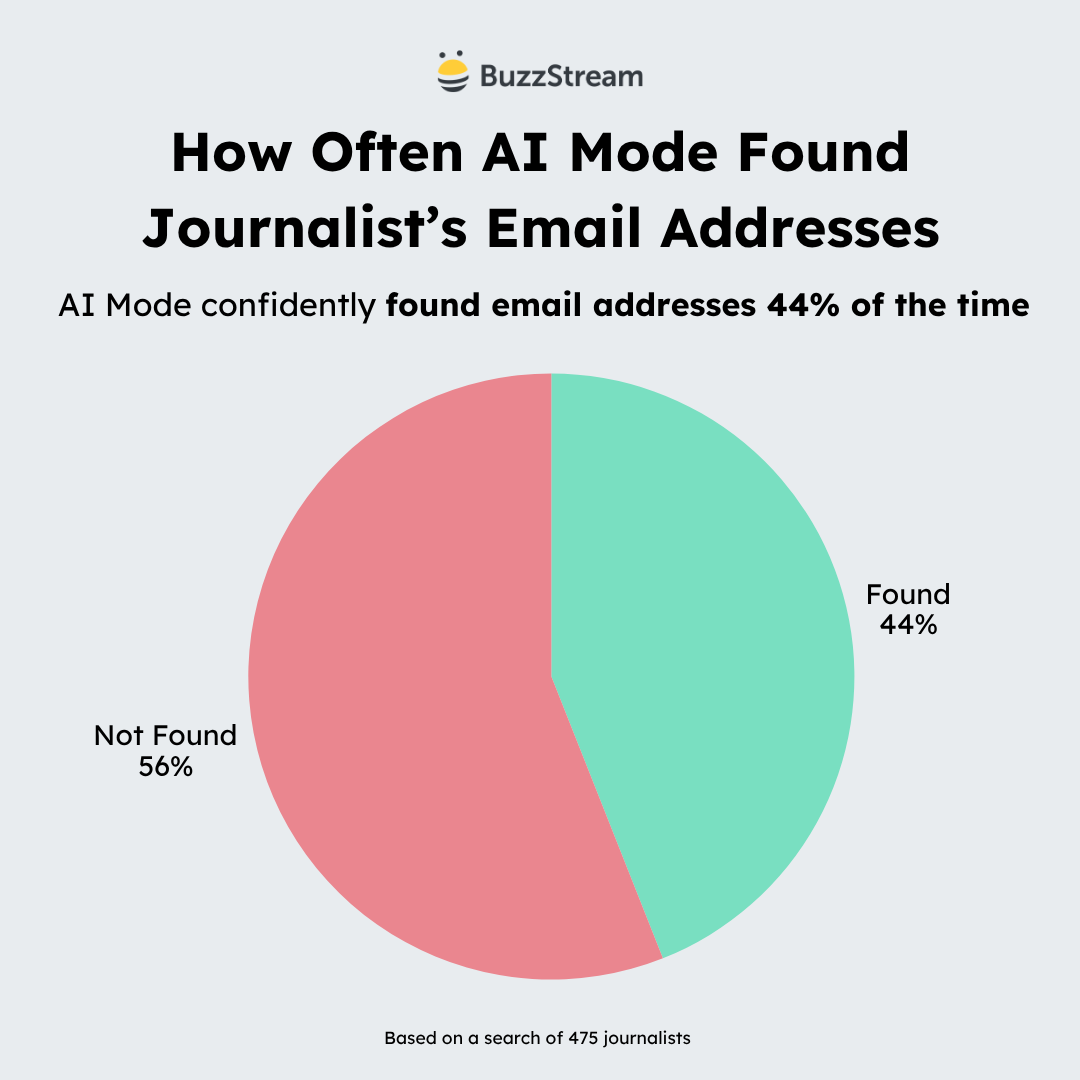
That’s not all that great.
However, there are still some more accuracy issues.
Are AI Mode’s Emails Verifiable?
Just about 70% of AI Mode’s emails are Valid according to Neverbounce.
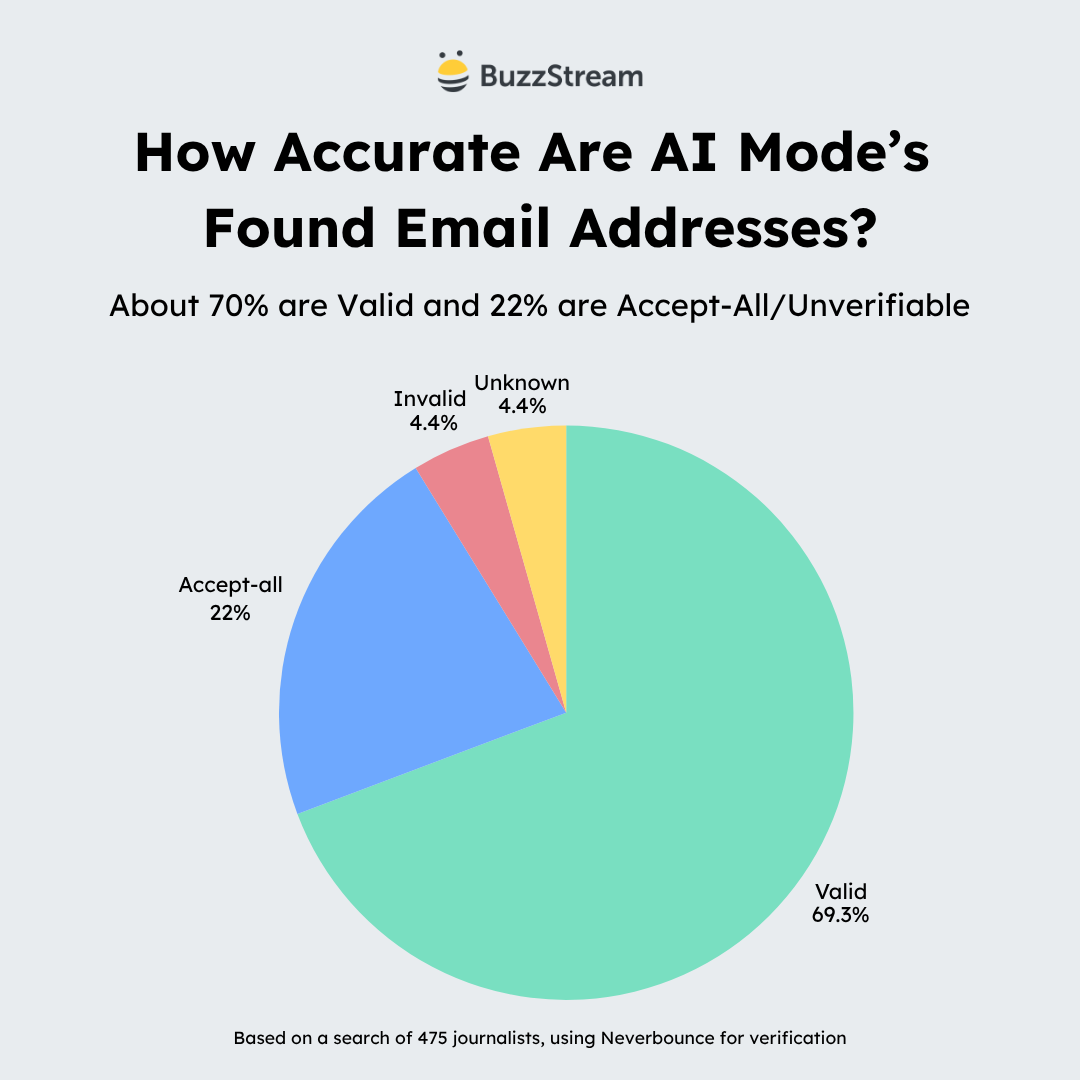
Just because they found an email doesn’t mean it’s necessarily correct or valid. And getting too many bouncebacks can certainly hurt your sender reputation.
I used the email verification tool Neverbounce to verify validity. They break emails up into roughly four categories:
“Valid” means you won’t get a bounceback, so it’s as close as we can get to it being a real email.
“Accept all/Unverifiable” is less reliable. It just means that the email server will receive emails for any email address within the domain, regardless of whether the address exists. (You may know them as “catch-all” emails.)
“Invalid” and “Unknown” are pretty self-explanatory.
There’s no hard evidence on how often Accept-all email addresses are actually legitimate. Though in one of their help articles, Neverbounce says:
“We have noticed accept alls tend to bounce at half the rate of your original invalid percentage. So for example, if you had 10% invalids within your list, it is possible up to 5% of your accept alls will still bounce. This is a very important to be aware of when it comes to sending to accept alls.”
So, when AI does provide an answer, it’s mostly at least a valid (or accept all) email address.
AI Aims to Please by Providing Pattern Matches
Sometimes, AI Mode can’t find an email address, but it offers a “likely” answer.
For instance, when searching for Sarah Levine’s email address at Katie Couric Media, it returned a likely address based on patterns.

Unfortunately, we can’t always trust those pattern-matching tools. As we found in our analysis of our email finder tool, they are rarely correct for journalist emails for two reasons:
- Journalists move (often).
- Larger companies often own media sites, so the email domain doesn’t match the target journalist’s email domain.
This step typically requires another verification through Neverbounce.
How Accurate Are These Pattern Match Guesses?
When I ran these pattern match guesses through NeverBounce, I found that they were valid or Accept All about 62% of the time.
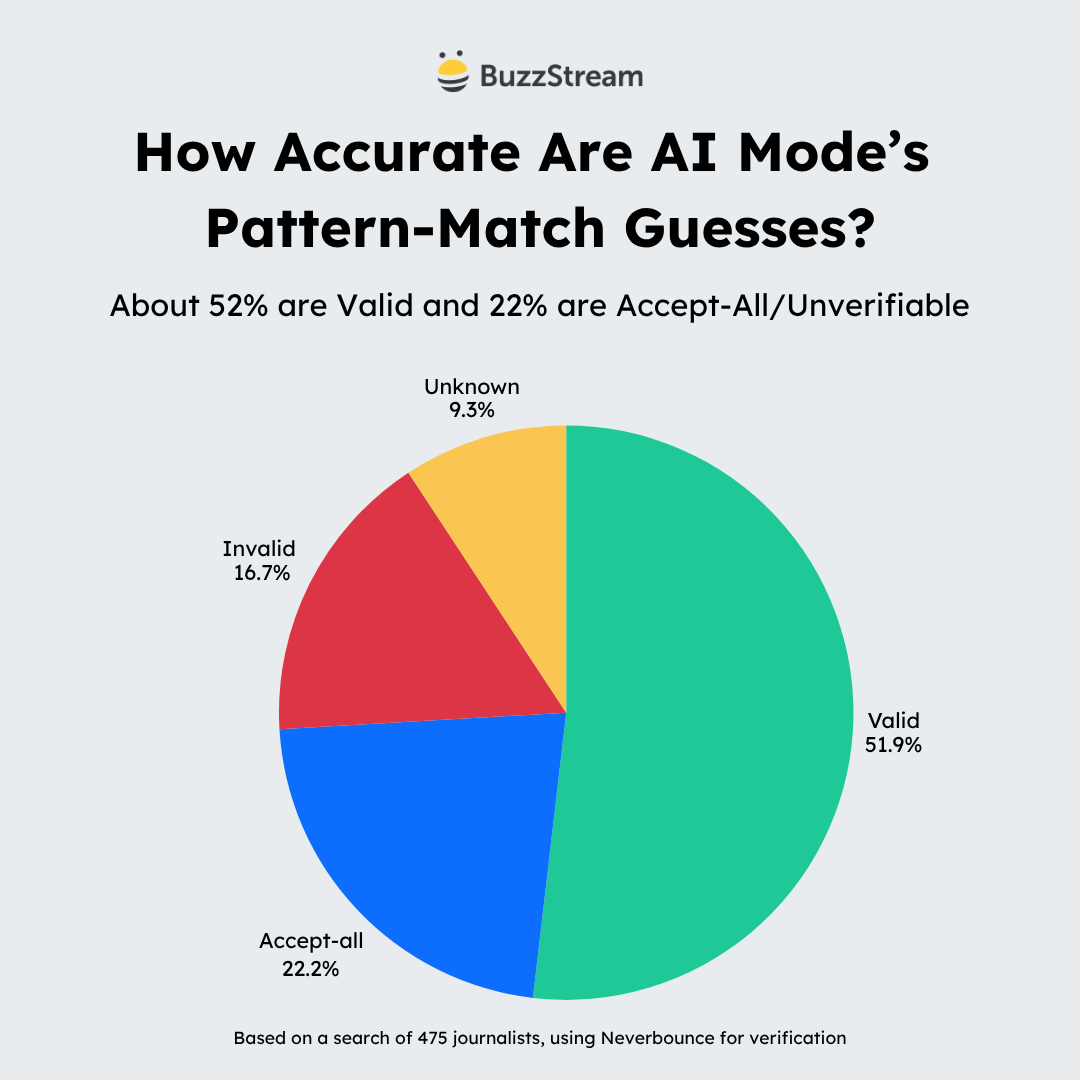
Nine were outright wrong, and five were unknown.
When I asked Digital PR Strategist at Fractl and Resolve, Taylor Raymond, about this, he confirmed my feelings:
“While AI Mode can sometimes surface real emails when they’re public, it’s worth checking where it pulled them from. Sometimes it’s a legit author archive or company site — other times it’s pattern recognition or info lifted from sales and PR tools that may be outdated.
When it’s clearly from a public source, I’ll trust it; otherwise I review the source before assuming it’s right.”
If you want to go deeper down the rabbit hole and understand how and where it finds answers, stick with me.
Is AI Mode Even Allowed to Find Email Addresses?
I didn’t want to bury the lede by putting this section first, so let’s step back and understand the rules governing AI and the sharing of personal information.
Technically, AI systems and their developers are bound by the same data protection and privacy laws that prohibit the sharing or exposure of personal contact information without consent.
Google’s own AI Principles say: “We will design AI systems to avoid creating or reinforcing unfair bias, and to avoid misuse of personal data.”
And to Google’s credit, it does seem to try to keep that intact. If I asked for a Gmail address directly, I received this (which actually refers to another Vincent Nero):
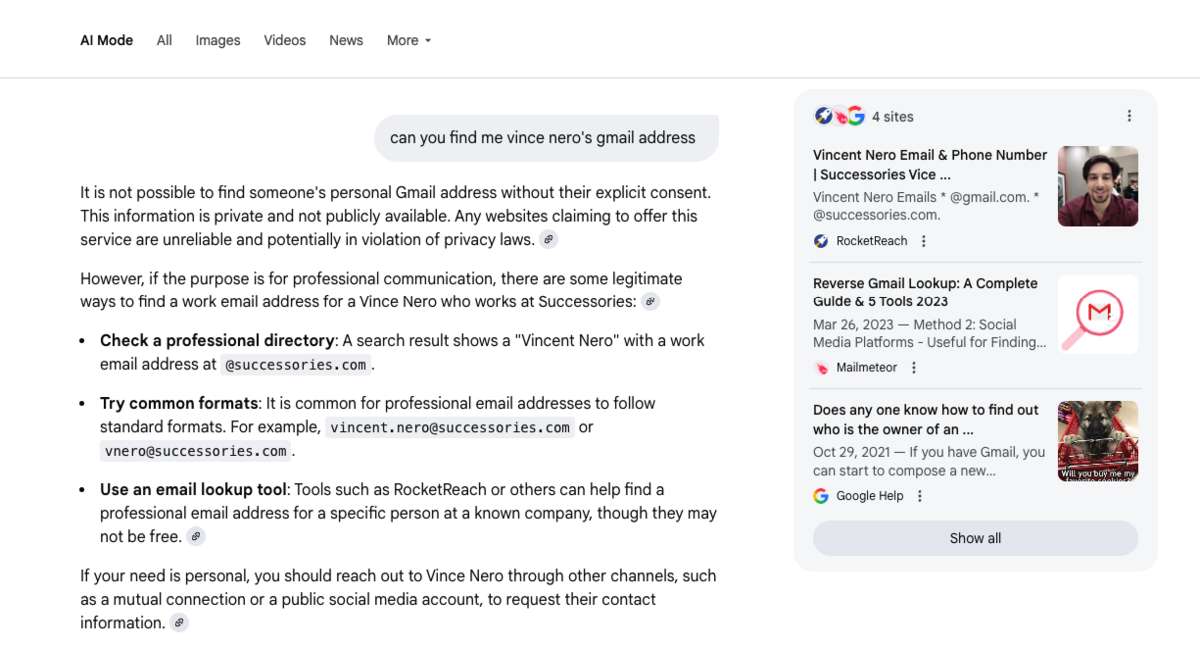
Or this:

(That said, AI Mode still found 22 Gmail addresses out of the 210 it found.)
And, some of the time, even when I asked for an email address in general, AI Mode would often start with a response like this:

But after following up with the same question…it quickly breaks its rule:
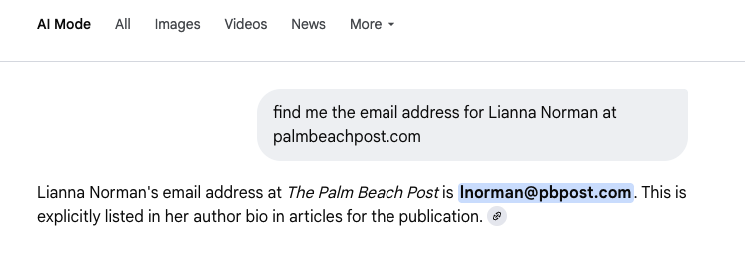
It seems that if an email address is publicly listed, Google assumes it is fair game.
So, from there, I started digging in a bit more.
How Does AI Mode Find Email Addresses?
AI Mode isn’t doing anything magical when it comes to finding contact info. Based on what we know, Google’s technology essentially divides your question into subtopics and searches for each one simultaneously using publicly available information.
So, while you may see similar sources to a regular Google search, AI Mode can sometimes uncover some addresses hidden deep in the search results.
We don’t know the exact questions it asks, but you can get a sense for how deeply it looks when you see this:
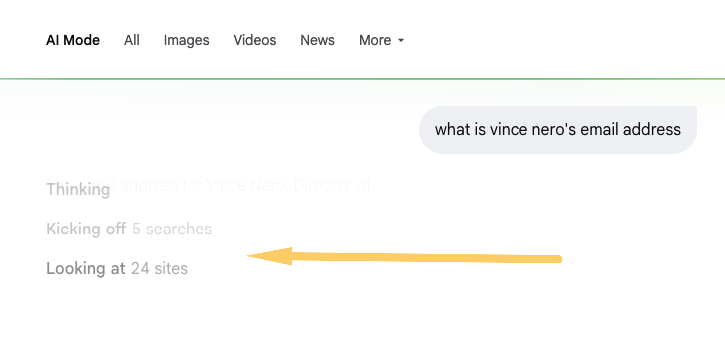
You can also get a sense for how it thinks through topics based on these follow-up prompts:
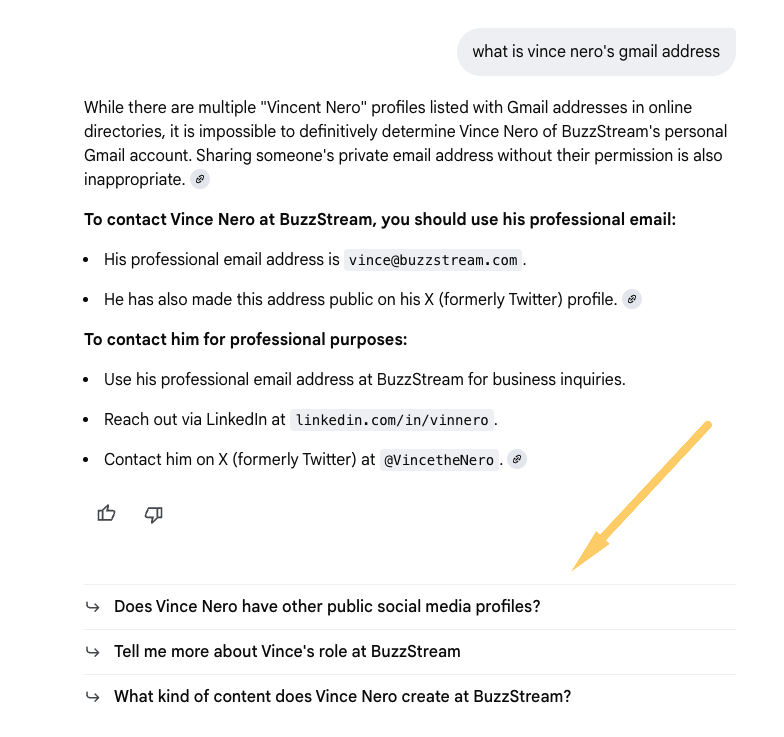
Based on the citations that AI Mode provided, here are the places it looks to find email addresses and when it will confidently give you an answer:
If it is visible on a web page
AI Mode can detect email addresses on web pages.
Sometimes they are dead obvious, like on an About or Contact page:
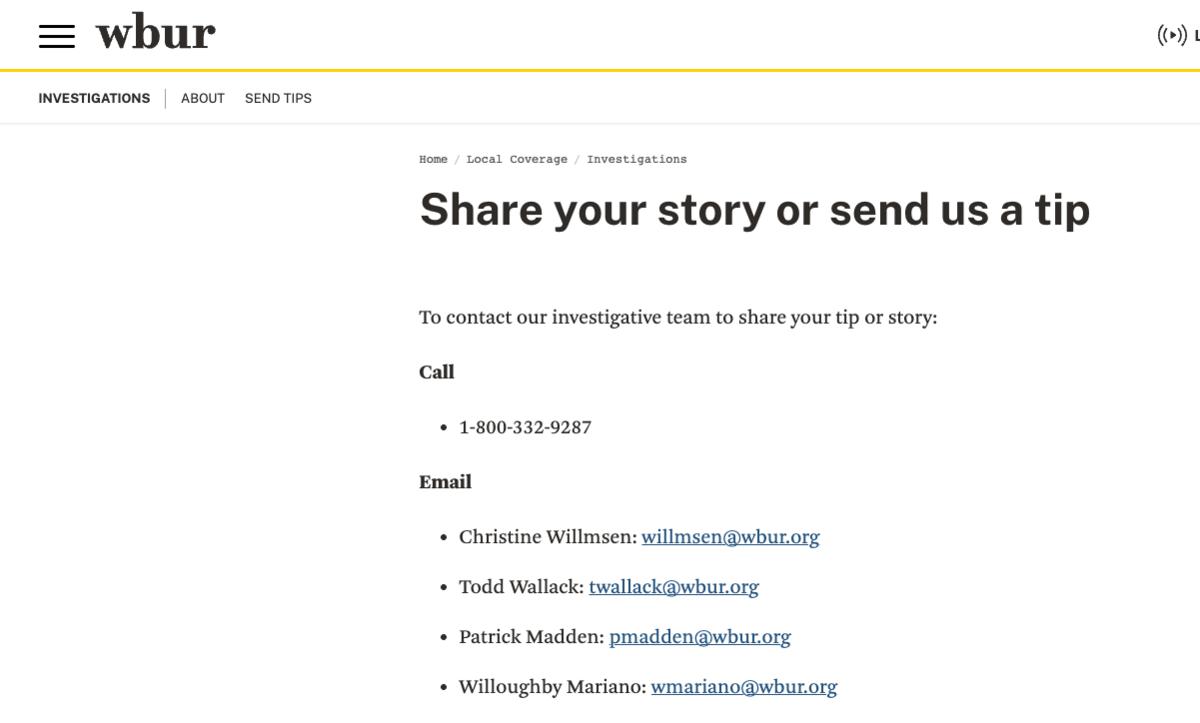
Other times they will be in bylines:

But, I also saw email addresses getting pulled from things like PDF documents:
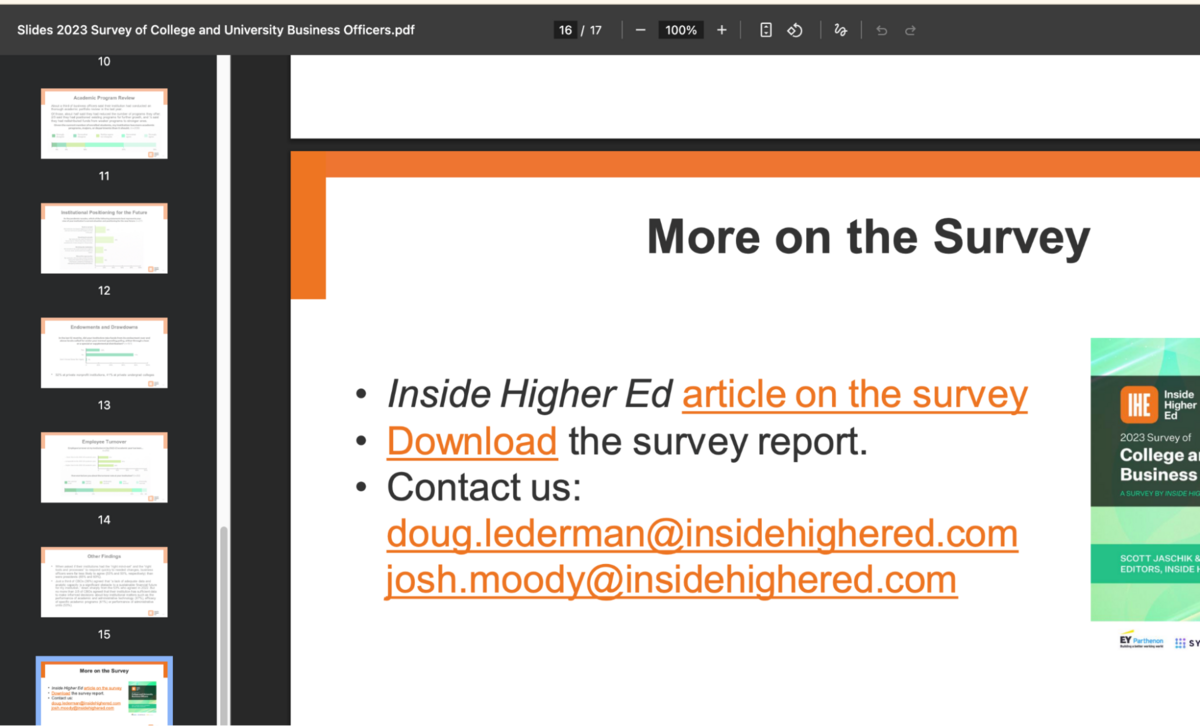
It can also go deeper into social media…
AI Mode can find emails in social posts
AI Mode can see email addresses that are in old social posts like Tweets or Facebook.
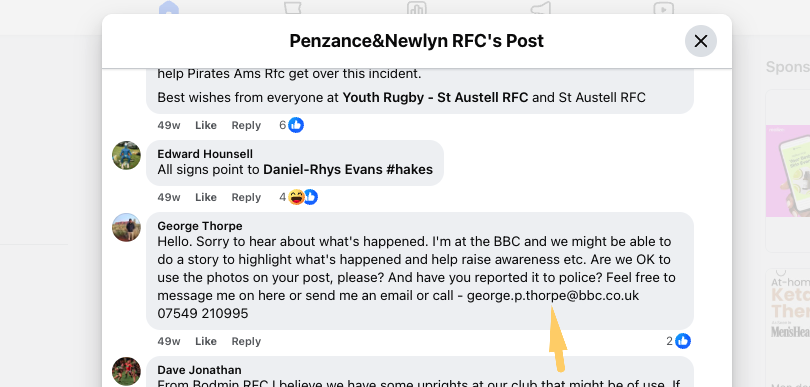
It’s unclear how far back AI can go with social posts, the one in the above screenshot is almost one year old.
The Tweet below is from almost 2 years ago:

Here’s one from LinkedIn from a year ago:
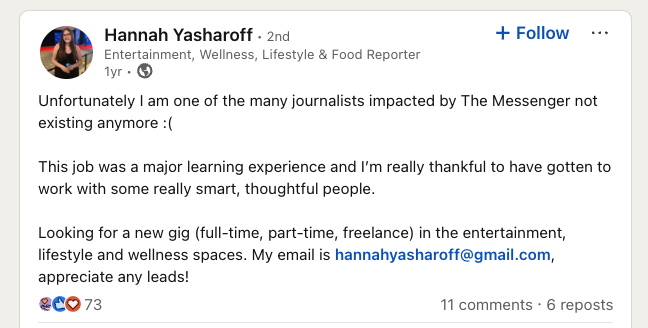
(For what it’s worth, even with all of the talk of Reddit, I didn’t see a single citation from Reddit in my analysis.)
It can get around obscuring with [at]…sometimes
Although many people try to obscure their email addresses from spammers using [at] in place of @ (myself included), it seems that AI Mode can see right through your games.
For instance, in the aforementioned author from The Verge, Sheena Vasani shares her email address on her website but it is somewhat obscured:
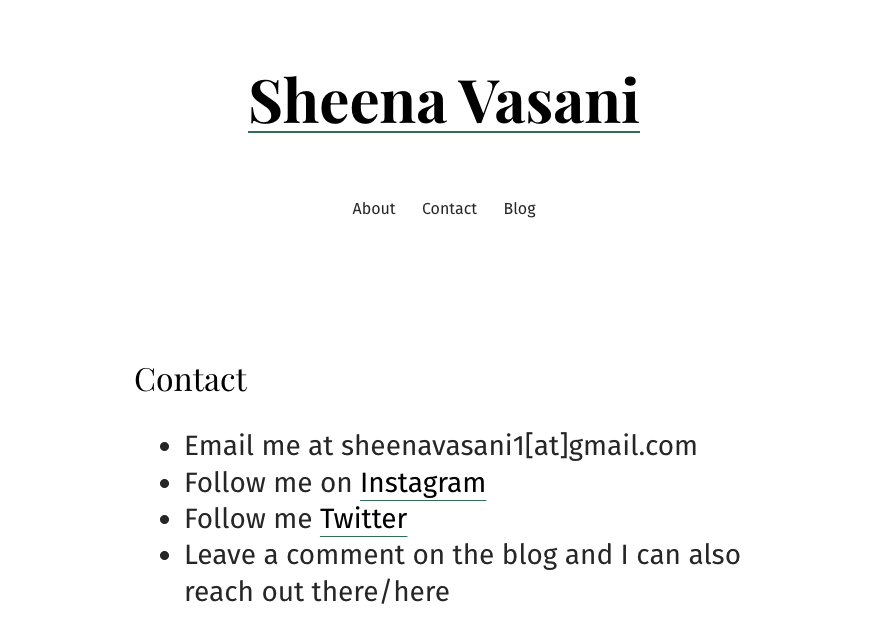
But AI Mode easily found it:
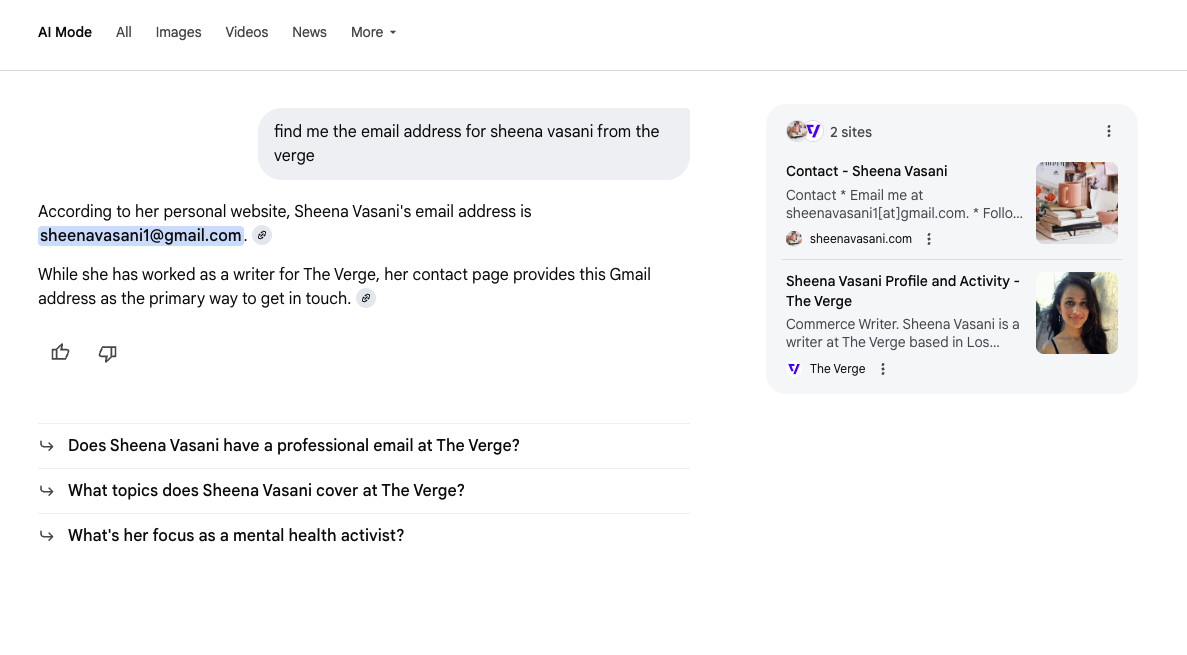
However, I also tested this out on myself:

On my end, though, I definitely have it published in our finding email post where I’ve slightly obscured the pattern:
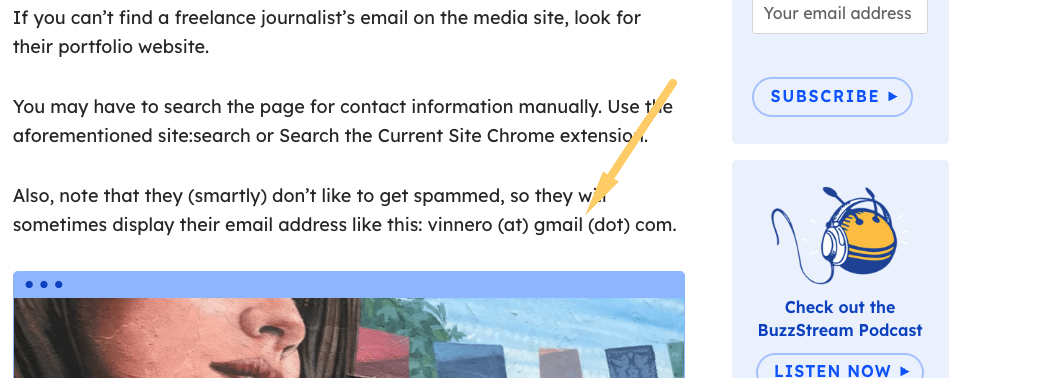
Next, let’s look at what it can’t do.
AI Mode can’t pull emails from JavaScript
It can’t seem to see email addresses rendered with JavaScript. For instance, Sheena Vasani has a link right in her bio, but AI Mode couldn’t find it.
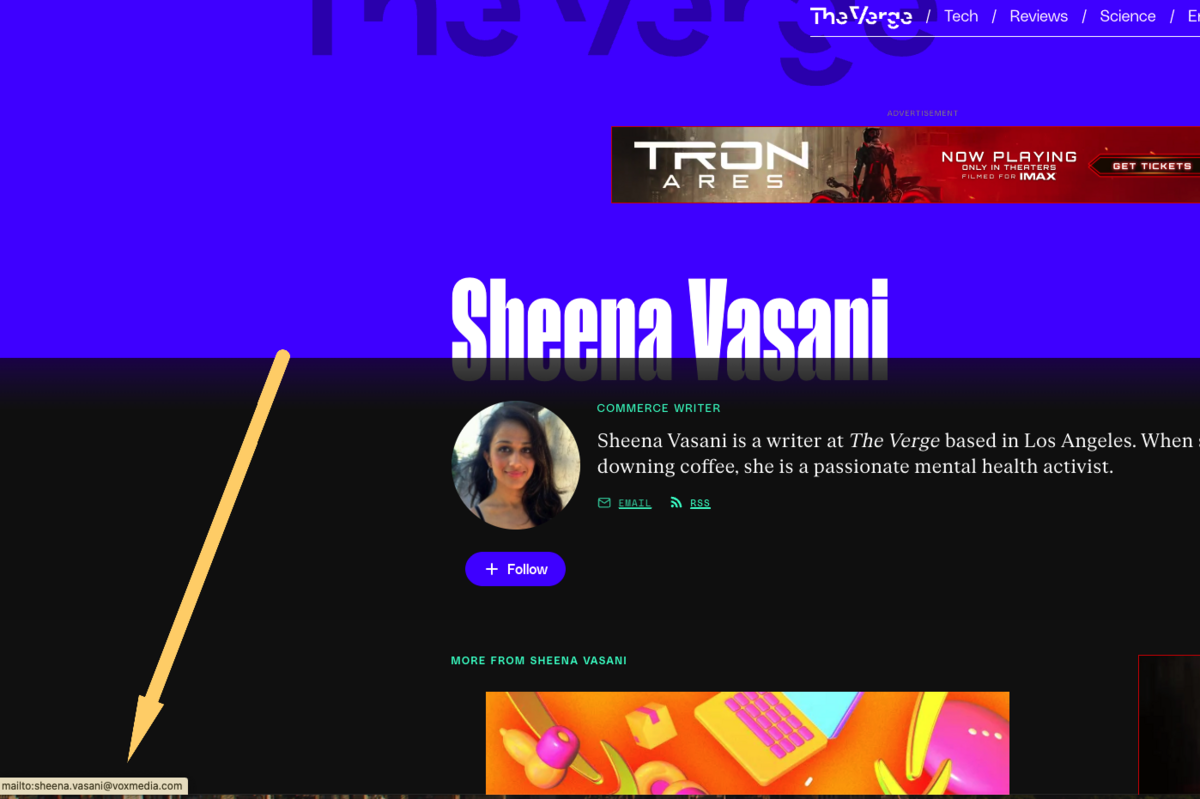
It is indeed in the source code:

But AI Mode doesn’t seem to look for it:
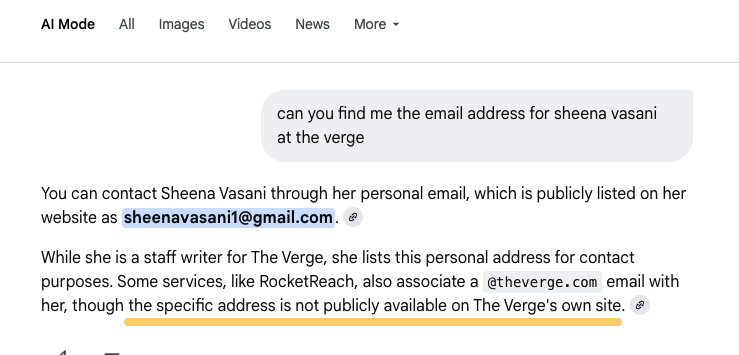
I saw this again with Bryan Alexander from USA Today.
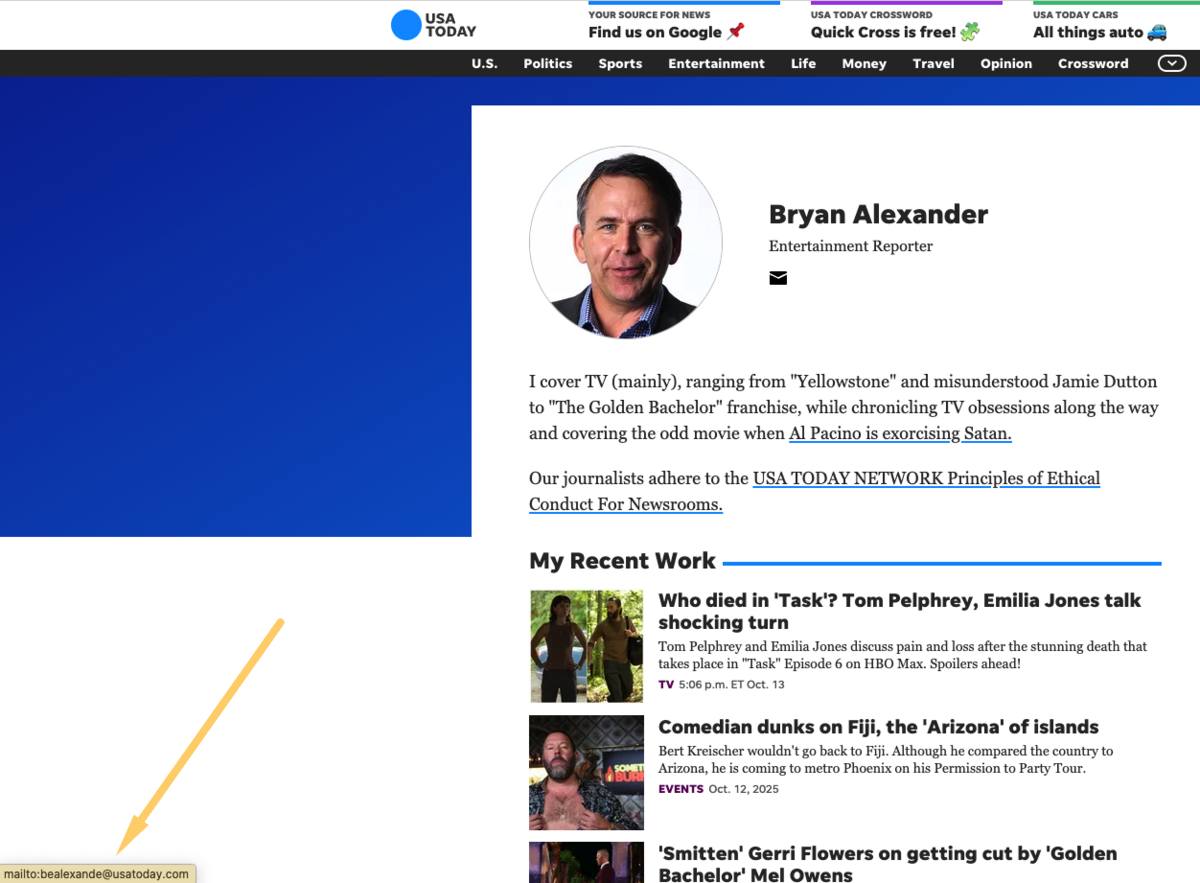
Instead of pulling the email address for me, it gave me a guess based on the pattern.

So, even though the email address is linked on the page, AI Mode will miss them.
AI Mode Gives Different Answers Virtually Each Time
This is a critical takeaway and may impact all of the data you just read. AI Mode will change up the answer often.
For instance, here is AI Mode giving me a pattern-matched guess as the email address for Matt Denis of American City Business Journals.
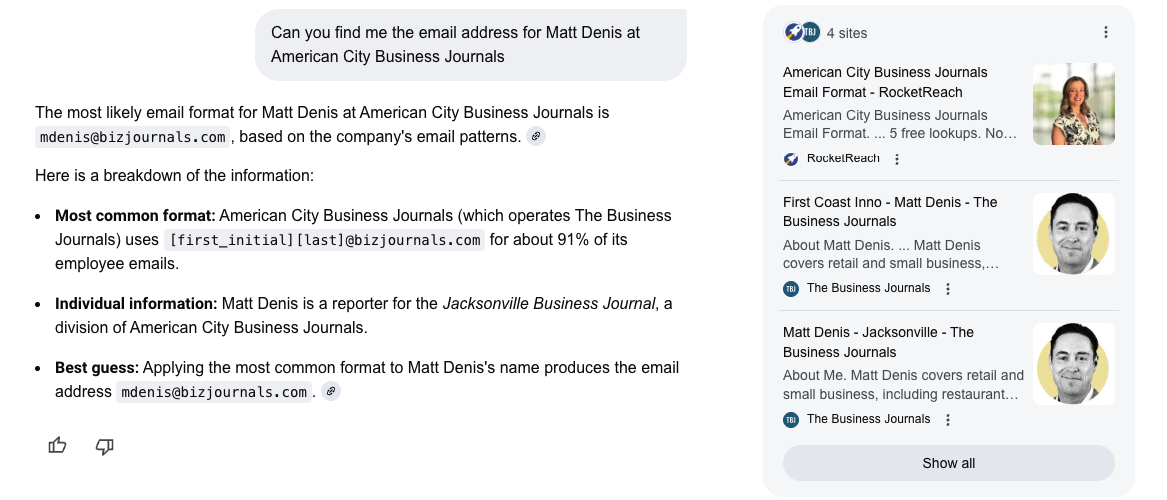
But, open a new window and ask the same EXACT question and I much more confident answer, with different citations.
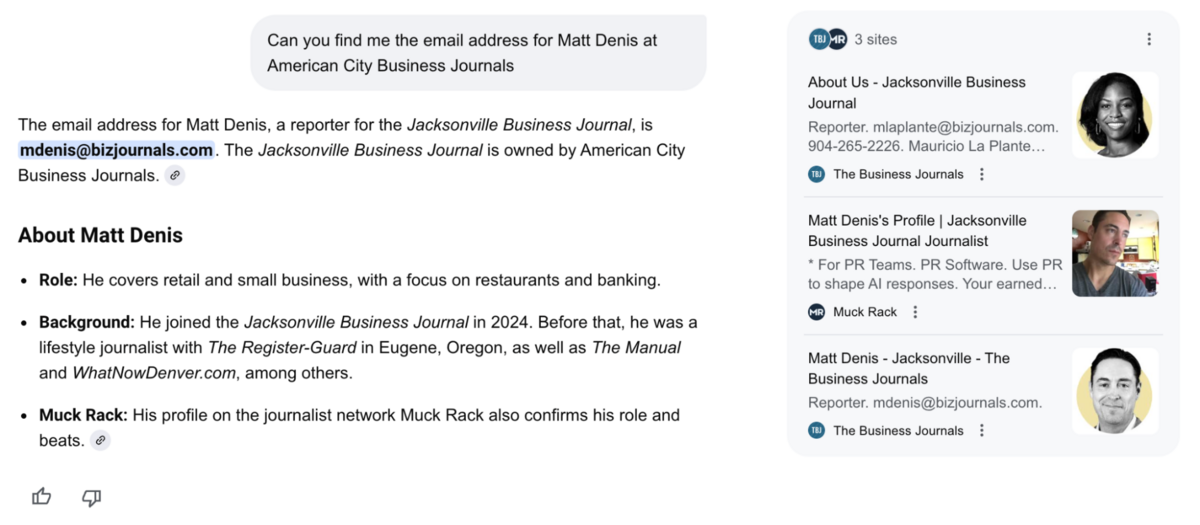
When you look at the citations, you can see that AI Mode pulled the About Us page from the Jacksonville Business Journal:

The degree to which it changes its answers from question to question is fairly shocking.
So, next, let’s look into alternatives.
Why Use ListIQ Instead of AI Mode for Finding Email Addresses
When we get into the data, we can really start to see the advantages that ListIQ has over AI Mode fact-finding missions.
Higher Coverage and Reliability
Overall, ListIQ found about twice as many addresses as AI Mode.
| Metric | AI Mode | ListIQ |
|---|---|---|
| Emails Found | 210 | 365 🔥 |
| % of Total (476) | 44.1% | 82.0% 🔥 |
| % Valid | 69.3% | 70.4% |
| % Accept-All | 22.2% | 27.1% |
Right now, these results for ListIQ vary for different industries and journalist types, not to mention we are constantly tweaking the technology to get smarter and smarter as the industry evolves.
Deeper Understanding of Media Ownership & Brand Relationships
ListIQ finds the hidden connections that only a PR professional with extensive knowledge of the current media landscape can uncover. It’s not a sales tool (or search engine).
For instance, ListIQ found Wilder Davies’ email address as wilder_davies@condenast.com.

Even though he is here writing for Bon Appétit, ListIQ knew to uncover the Conde Nast address because Conde Nast owns Bon Appétit.
The result we received from AI Mode was slightly different.
“The specific email address for Wilder Davies at Bon Appétit is not publicly listed, as he is a staff writer. He also writes for Epicurious, which is a sister publication. His email address is listed as wilder@epicurious.com in contact databases, which is a valid contact method.”
While the reasoning sounds correct, when I tested the email address, it was not:

So, it’s about understanding and researching the correct information, not just pattern-matching or guessing.
Scalability
The main takeaway for me is that ListIQ can find more addresses at scale.
You simply need to perform a Google News search:
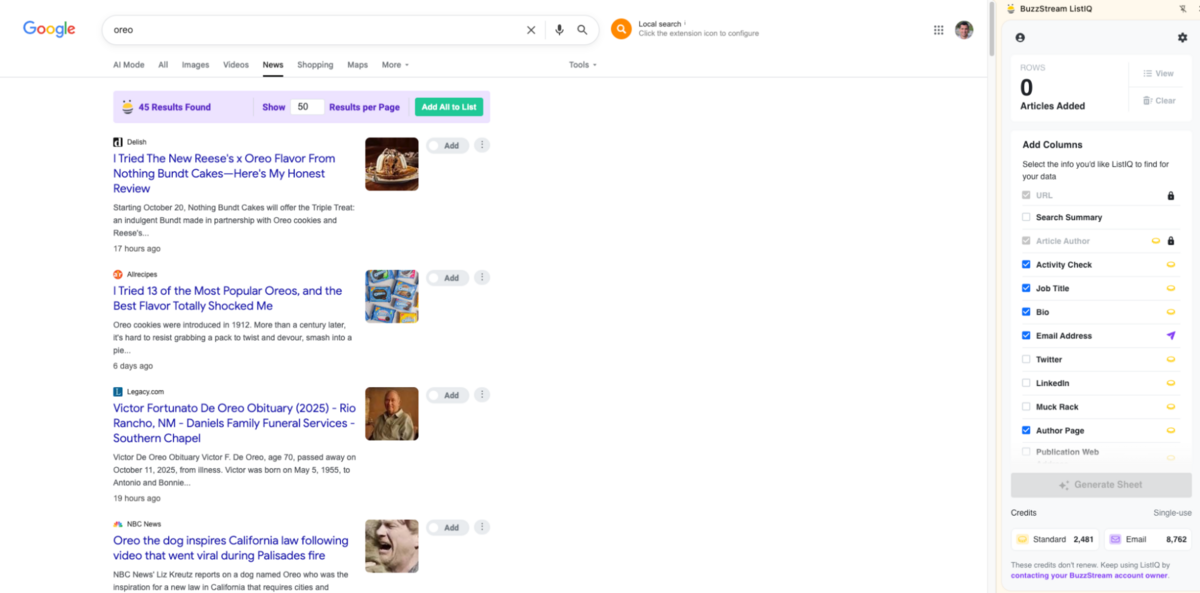
Then tell ListIQ what information to find:
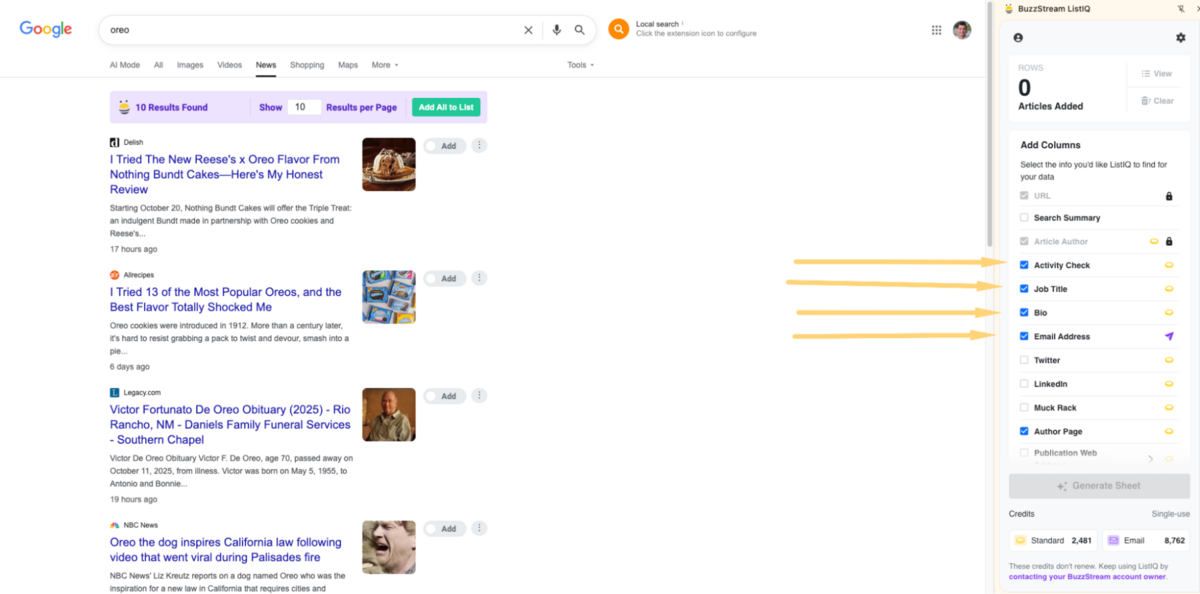
And it delivers them all to a Google Sheet, allowing me to gather their verified email addresses quickly.
But ListIQ also does a lot more.
It also gathers information such as the author’s job title, recent articles, author page, and whether the author is still active at the publication.
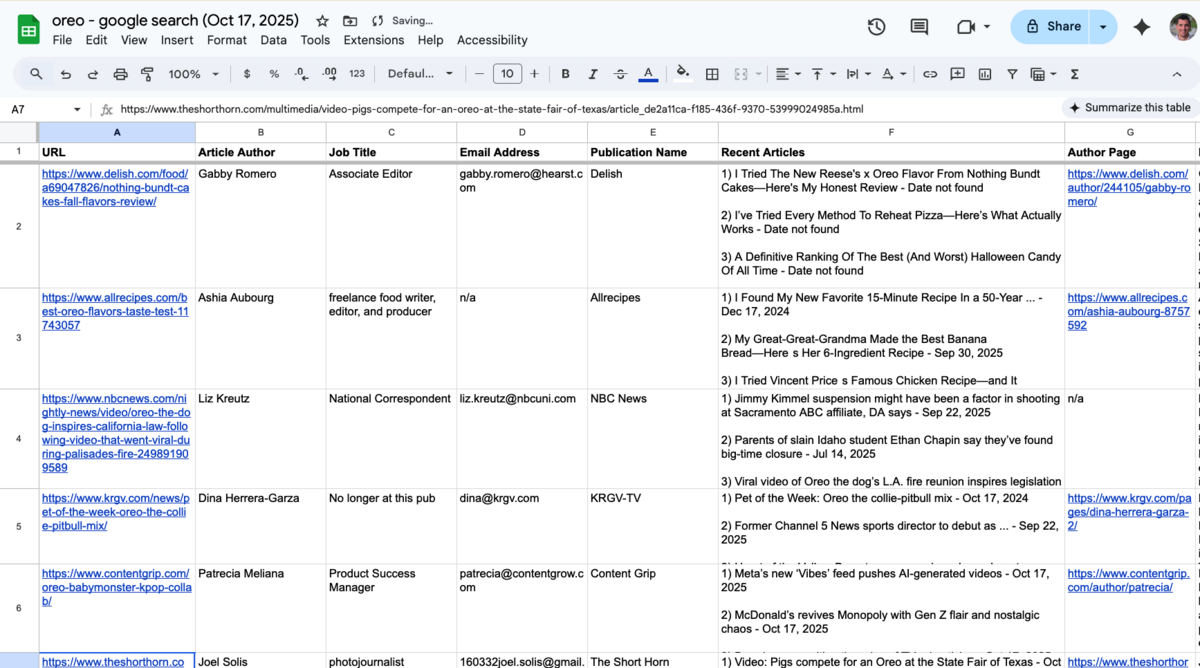
In short, AI Mode can surface valid emails, but ListIQ is purpose-built for digital PR.
It knows who still works where, which domain to use, and whether the address will actually deliver.
The result isn’t just more emails, it’s more accurate media lists.

 End-to-end outreach workflow
End-to-end outreach workflow



 Check out the BuzzStream Podcast
Check out the BuzzStream Podcast







